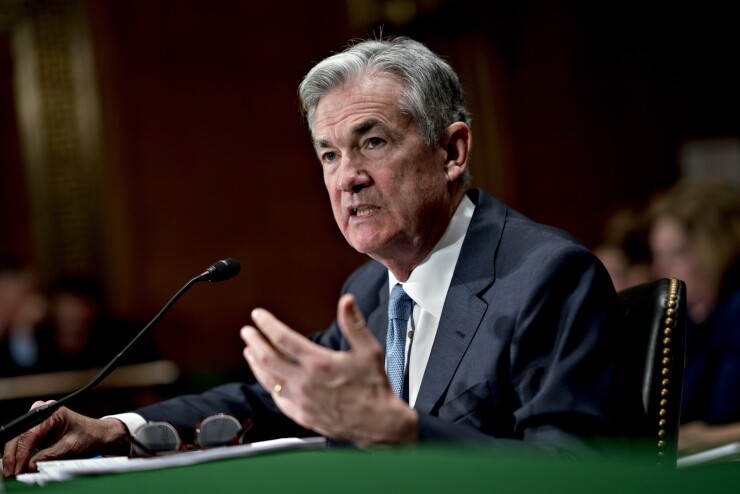While his testimony before the House Financial Services Committee had market participants speculating about four rate hikes this year, Federal Reserve Board Chair Jerome Powell’s session before the Senate Banking, Housing and Urban Affairs Committee had more talk of balanced risks and slightly higher inflation.
“Risks are more balanced than they used to be” and there’s “lots of slack in the labor market. We don’t want to get behind the curve and cause a recession,” Powell said, adding, “to prolong the recovery, the panel feels we should continue the gradual increases.”

"The Committee has stated that we do not expect it will be appropriate to reduce the target range for the federal funds rate until we have gained greater confidence that inflation is moving sustainably toward 2%."
“By continuing to gradually raise interest rates over time, we’re trying to balance” inflation and employment, “and achieve inflation moving up to target but also make sure the economy doesn’t overheat,” Powell said in response to a question. “We expect that will continue to be the case.”
He added, “There’s no evidence the economy is currently overheating.”
The little slack left in the labor market can be removed without spiking inflation, and while there’s been an uptick in wages, he said, “We don’t see any strong evidence yet of a decisive move up in wages.”
However, Powell admitted, “I would have thought you would have seen more wage increases by this point. This is what we’ve been waiting to see.”
“Powell’s performance confirms the assumption that he can be expected to continue the policies of Yellen and Bernanke,” according to Gary Pzegeo, head of fixed income at CIBC Atlantic Trust. “His comments on improving growth, stronger labor market, and inflation should not have been a surprise to markets. They are essentially a repeat of the minutes for the Yellen Fed’s January meeting.”
When asked about tax reform, Powell commented that it is “one of many, many factors” the Fed will use to determine appropriate monetary policy, noting it will “add meaningfully to demand for at least the next couple of years. The real question is how much it will add to longer-run growth. That is highly uncertain.”
Responding to a question about why inflation is so low, he said, it’s a “global phenomenon,” noting, “we don’t completely understand it.”
It’s a good time to get the U.S. on a sustainable fiscal path, while the economy is strong, Powell suggested.
When asked about the volatility in the stock market, Powell explained, “Longer-term interest rates have been going up,” and expectation are for higher growth and “inflation moving closer to our target.” When asked specifically about inflation and the stock market, he responded, “It could be a sign of slightly higher inflation.”





